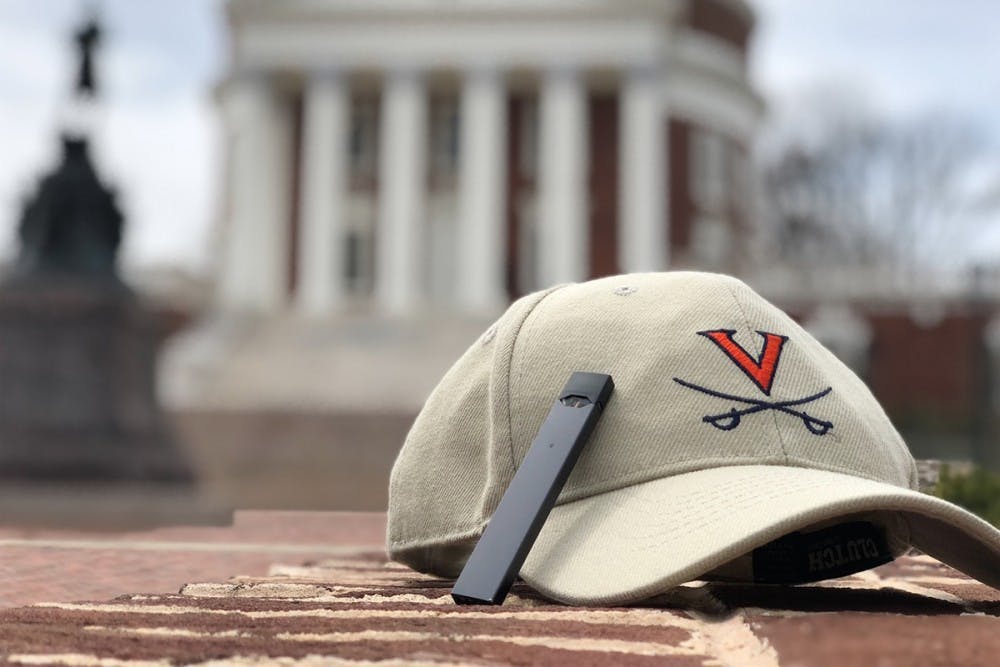It’s hard to overstate the transformative effect the Juul has had on modern culture. People all over the country have become smitten with the e-cigarette and it’s easy to see why — Juuls are cool. They’re sleek, they fit in your pocket and they come in a variety of appealing flavors. But that really doesn’t tell the whole story — Juuls are a staple of younger society, the University included. Whether it’s at bars, house parties, libraries or even in large lecture halls, it’s not uncommon to see one or more people “Juuling.”
A few months ago, the Food and Drug Administration declared the underage use of e-cigarettes to be “an epidemic” in response to growing number of high school and university students using Juuls and related devices and consequently released a foreboding message to Juul and several other e-cigarette companies — prove you’re able to control the underage usage of e-cigarettes within 60 days or face civil and criminal prosecution.
60 days came and went to no avail, and so the FDA has recently moved to ban the sale of all fruity, or “kid-friendly” flavors of e-liquid at all physical stores that aren’t explicitly “adult only,” like vape shops. Convenience stores and gas stations, which are some of the most common places to buy Juuls, will be specifically affected by the restriction. Juul acted slightly prior to the ban in order to spin the decision as “voluntary” and have already began halting retail distribution of a majority of its flavors. The FDA has struck back at Juul in an unprecedented way, but it begs the question, what’s so special about Juul that it demands such drastic action?
In truth, very little. The Juul operates the same as many others on the market, and the product can be easily replicated with countless others in a vape shop. The one aspect of Juul that truly makes it unique is its popularity — no other device has penetrated the vaporizer market with as much vigor as Juul. Convenience stores all over the country have Juuls in their inventory, making it one of the most widely available vaporizers of its kind. Juul has come under fire for fundamentally being a successful business. Within three years of its introduction, the company has grown to have a more than 70 percent market share of the e-cigarette industry, despite their product being functionally identical to countless others.
Clearly the reason behind the FDA’s focus on Juul is its popularity — however that alone shouldn’t justify the actions the FDA has taken. It’s no secret that vices like alcohol and tobacco regularly fall into underage hands, but where are the debilitating restrictions for Corona, Heineken or Marlboro? It’s a poor reflection of the FDA’s priorities that the popularity of a device merits a ban more so than the health concerns associated with it, especially relative to other seemingly obvious candidates for such punitive treatment.
The FDA might actually do more damage by restricting vaporizers than the so-called “epidemic” was wreaking on its own. Juul pods contains up to two packs’ worth of nicotine, and with so many people now unable to purchase their Juul pods of choice, it’s not a stretch to imagine that some will turn to cigarettes seeing as they are the most readily available substitute. Anyone old enough to purchase a Juul is also old enough to buy a pack of cigarettes, meaning this really could occur. It is possible the FDA has allowed their distaste for vaping to indirectly promote smoking, which is a shame, especially given that, as the FDA has pointed out, many of the young people that use Juuls have never smoked before. The FDA understands the addictive quality of nicotine, as demonstrated in their actions against Juul, but seemingly fails to account for the lengths those addicted to nicotine will go to get the chemical.
While the concern of nonsmokers using Juul is a valid one, it often overshadows the fact that Juul gives actual cigarette smokers a healthier alternative that both adequately satisfies their desire for nicotine and is widely available. A simple web search will reveal that there are real smokers, with real stories, who have been able to drop the habit due to the ubiquity, simplicity, and quality of the Juul. The late Prof. Michael Russell, one of the early champions for tobacco harm reduction, was often quoted saying, “People smoke for nicotine but they die from the tar.”
Let’s be clear, I do not believe e-cigarettes should be used by those without a pre-existing dependency on real cigarettes. While it is possible vaporizers do not have the same health detriments as cigarettes and alcohol, they don’t have the same breadth of long-term research behind them either. The issue lies in the way the FDA decided to approach the regulation of e-cigarettes. The ultimate goal of tobacco harm reduction should be to save lives. The FDA felt there were too many underage kids using vaporizers, but rather than take a look at the shortcomings of the current age verification method, the same method used to limit the sale of alcohol and cigarettes to minors, they chose to carelessly handout restrictions that could have devastating consequences, as well as hurt the businesses who sell them.
Shrey Dua is a Viewpoint Writer for The Cavalier Daily. He can be reached at opinion@cavalierdaily.com.







